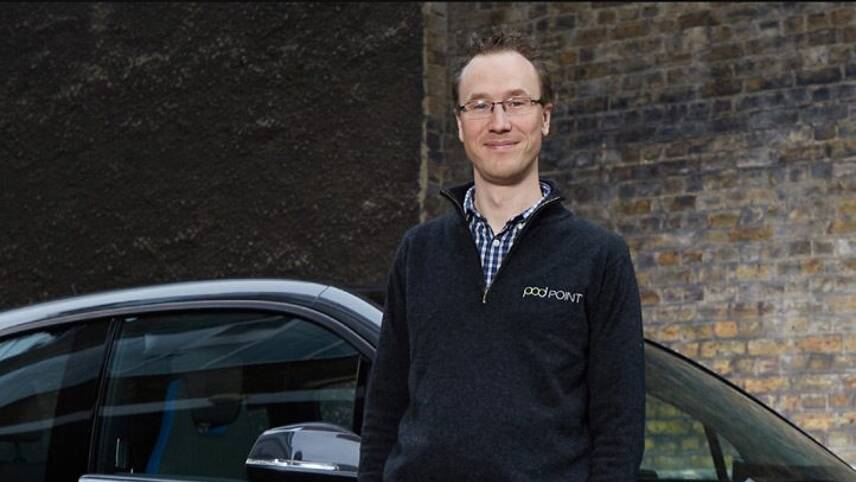Register for free and continue reading
Join our growing army of changemakers and get unlimited access to our premium content

Pictured: Pod Point’s founder and chief executive Erik Fairbairn
Under the deal, completed today (14 February), EDF will supply energy to all of Pod Point’s EV charging infrastructure, and provide the firm with its smart charging tariffs and technologies. These assets enable EV drivers to charge when energy prices are lower, and when the grid mix is lower-carbon.
Pod Point owns and operates 62,000 EV charging points across the UK, located at businesses, public sector organisations and at homes. Notable business customers in the UK include Lidl GB, Tesco and Centre Parcs. Pod Point also has smaller operations in Norway, with 6,600 EV charging points.
EDF did not disclose what stake it has acquired in Pod Point, or how much it paid to do so. However, it confirmed it has been working with Legal & General, which will take a 23% stake in the joint venture, to seal the deal.
“By joining up with EDF we can take things to the next level and accelerate our national roll-out of charging points and make it even easier for drivers across the UK to go electric,” Pod Point’s founder and chief executive Erik Fairbairn said.
“I’m immensely proud of what the Pod Point team has already achieved but think it is only a fraction of what we will now be able to do with EDF.”
EDF, meanwhile, said the new investment would help drive progress towards the targets listed in its Electric Mobility Plan. Published in 2018, the plan commits the business to serving 600,000 EVs across Europe by 2022 and to “transform power systems” in line with the EV revolution.
On the latter, EDF is investing heavily in flexibility services such as smart charging, vehicle-to-grid (V2G) technology and grid-scale batteries. It notably owns stakes in Pivot Power, NUVVE and Ubitricity. But it is also increasing investment in both renewables and nuclear, which collectively account for 87% of its UK portfolio at present.
The bad news…
While the announcement from EDF will be welcome news in the EV charging infrastructure space – particularly given that the growth of the UK’s EV stock has been outpacing charge point installations for several years now – headlines from the car manufacturing space this week have not been so positive.
Honda this week confirmed that its Swindon factory will close in July 2021, leaving some 3,500 staff out of work. The Japanese carmaker said that it wanted to bring its EV production closer to home as it strives to electrify its entire European portfolio by 2022, particularly due to global shifts in the car market that can, in part, be attributed to Brexit.
The announcement came after Dyson axed its electric car project, which would have seen a new model manufactured and assembled in the UK, ready for a 2021 launch. Similarly, hybrid and fully electric models sold in the UK by the likes of Nissan, BMW and Vauxhall are now manufactured or assembled – either in full or in part – outside of the UK.
Also this week, Ford Europe boss Stuart Rowley has urged the UK Government to rethink its 2035 ban on new petrol and diesel car sales, moved forward from 2040 earlier this month. The ban currently applies to hybrid vehicles, while Rowley would like such vehicles to be exempt if Ford is to continue growing in the UK.
Rowley told the BBC: “Plug-in hybrids can be an important part of the technology mix.
“[Meeting the deadline] is going to require huge investment and for us to work together as an industry, the government, cities and consumers to make this transition.”
The Committee on Climate Change (CCC), which advised the UK to set the 2035 target in line with its national net-zero target for 2050, has said it did so in order to get the majority of internal combustion engines from cars – hybrid or otherwise – off of UK roads by mid-century.
Sarah George


Please login or Register to leave a comment.